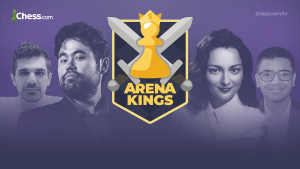
Study Plan For Beginners: Bringing It All Together!
Target Skill Range: Beginner (Rated 1000-1399)
Put your skills into practice, and use everything you've learned to win chess games!
Tasks:
- Build your concentration and focus.
- Watch videos lectures on practical thinking.
- Learn the top 10 reasons a chess player loses.
- Gain experience by playing games.
- Learn to review/critique Your own games.
- Read this article about practical thinking and technique.
- Take the quiz!
No matter how much you study openings, tactics, strategy, and endgames, you still need discipline, experience, psychological strength, and a solid thought process to win games! Here you will work on converting your newly acquired chess abilities into wins!
This course should be started only after you have made (at least) some significant progress in the previous Plans on openings, tactics, strategy, and endgames.
1. Build your concentration and focus.
Here are four exercises in "chess meditation" that you can do to improve your ability to focus, visualize the chess board, and build "mental stamina." The second and third bullet points below can be repeated until you learn more difficult visualization exercises (coming in future study plans); the fourth should be repeated until you consistently score 100%.
- Watch this video, while following all instructions to pause and think. Take each question seriously as though it were your own game, and as if the video author were talking to you personally: Amazing Games for Beginners: Tunnel Vision by IM David Pruess
- Sit and stare at an empty chessboard. Pick a square. Clear your mind of everything except that square. Think about the square for 10 minutes.
- Each day: get out a chessboard and pieces. Set it up. Before the end of the day pack it up again.
- Play the following game with a friend: set up a board and one of you closes your eyes. The other person names 10 squares on the board, and you try to identify the square as white or dark as each square is named. Keep track of your score; then trade roles and repeat the exercise.
2. Watch these video lectures on practical thinking:
Try to fully engage yourself in these video lectures as if each one of them were specifically designed for you. When asked to do so, pause the video and try to answer the author's question(s):
- Everything You Need to Know: Bringing It Together by IM Daniel Rensch
- Tactics Do Grow on Strategies by IM David Pruess
- Tactics do Grow on Strategies 2 by IM David Pruess
- Member Analysis: A Slave to Your Preferences by IM David Pruess
- Amateur Game Review: Chess Crimes 1 by IM Daniel Rensch
- Amateur Game Review: Chess Crimes 2 by IM Daniel Rensch
3. Learn the top 10 reasons a chess player loses.
It is important for you to keep track of these common mistakes as a "reference list" as you consider your own losses. One could argue that no game is lost without one of these "Top 10" mistakes taking place at some point. (You will use this list to assess your games in a future task!)
- I did not see (or underestimated) my opponent's threat(s).
- I did not develop/get castled.
- I ignored a passed pawn that ultimately promoted.
- I sacrificed prematurely to attack and could not find a checkmate.
- I got behind on material from bad tactics.
- I could not stop a mating attack.
- I did not try my hardest (lack of focus).
- I played too fast.
- I took too much time, and eventually I ran out of time or blundered.
- I did not have any idea how to proceed or find a plan.
4. Gain experience by playing games.
Practical experience remains vital!
We recommend at least 15 minutes per side, or you can...
While playing, try to be proactive: consciously look for opportunities to apply the different rules and principles you've learned from the previous plans for beginner chess players.
Please also keep in mind proper chess etiquette:
- Be polite in all the games you play, including trying not to ever lose on time (complete all games you start).
- When you lose a game, thank your opponent for the game, and see if they will talk with you and give you any advice or thoughts about the game.
5. Learn to review/critique your own games.
Warning: Do not use computers to look at your games! Absolutely not! We take no responsibility for your progress if you do!
This is far better: First, create a text file for yourself. In this file you will record the reasons why you have lost your games. Now, play through one of your lost games. Consult the list from Task #3 above. Is one of the "Top 10" the reason you lost your game? If so, recognize which reason it is and write it down yourself—using more specific language. Example:
Reason #1: I did not see my opponent's threat/underestimated their threat(s)
"My opponent moves his knight to attack my queen, and I missed the threat."
Note: Don't analyze long alternative variations to the moves played in the game. Simply identify the errors that caused your loss! You will learn detailed game review techniques later, in more advanced study plans.
Now and then, read over your "Reasons I Lose" list. Keep track of what the most common ones are, and focus on eliminating those particular weaknesses.
It may take over 200 games with this review process for a player to go from 1000 to 1400. Review is just as important as playing.
6. Read this article about practical thinking and technique:
K.I.S.S. -- Keep It Simple by GM Magesh Panchanathan
Test your new skills:
Question 1: In the second game reviewed from his video "Everything You Need to Know: Bringing it Together" who does IM Rensch say is often considered the greatest endgame player of all time?
Question 2: In our "chess meditation" task, what is the only "daily" recommendation to help build chess focus and discipline?
Question 3: What TV Character from the show "Seinfeld" is referenced in GM Panchanathan's article, K.I.S.S. -- Keep it Simple?
Question 4: What opening is on display in IM Pruess's first "Tactics Do Grow on Strategies" video lecture?
Question 5: What minor piece is left to capture the queen in our example sentence from Task #5?
Answers: 1. Jose Rual Capablanca; 2. "getting out a chess board, setting up the pieces, and putting it away before the end of the day"; 3. George Costanza; 4. Benko Gambit; 5. Knight.






